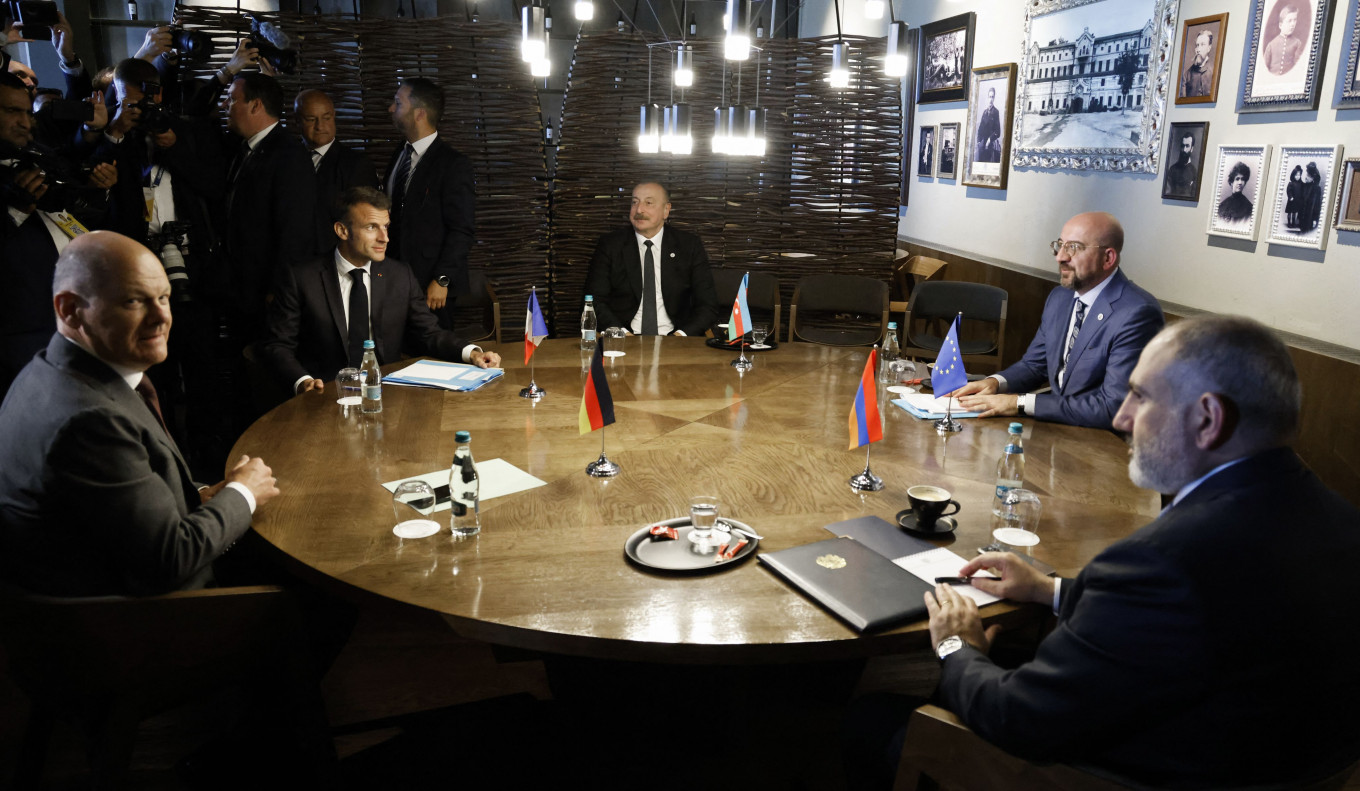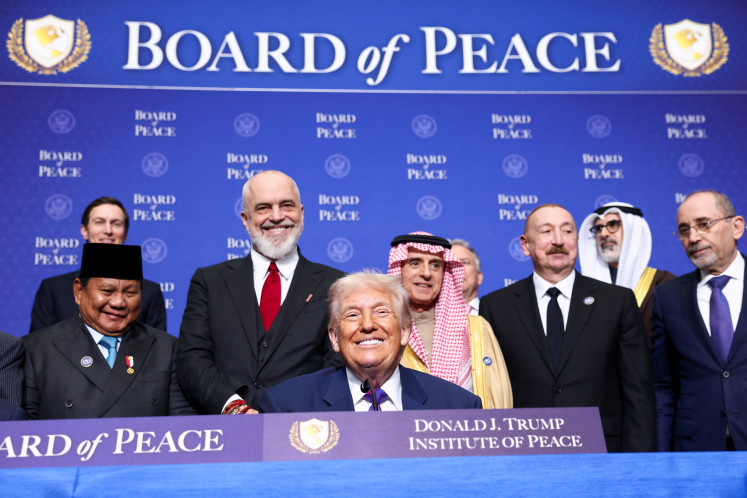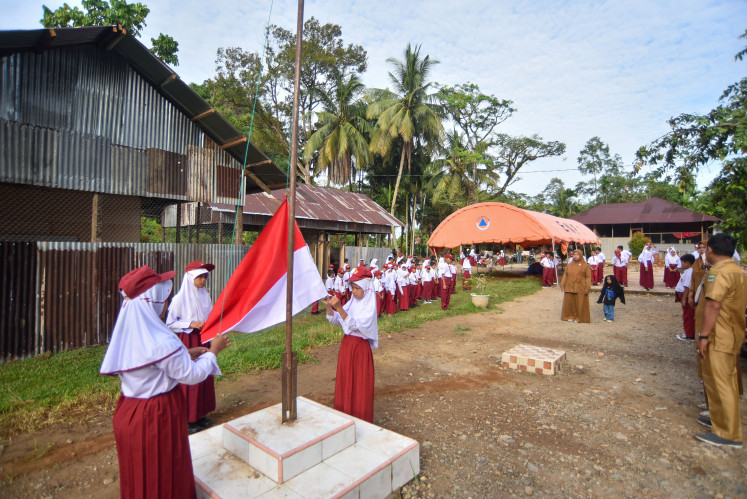Popular Reads
Top Results
Can't find what you're looking for?
View all search resultsPopular Reads
Top Results
Can't find what you're looking for?
View all search resultsThe Elysée Treaty for European unity, global peace and prosperity
A solid and fruitful friendship between German and French peoples has gradually taken root, to the benefit of strengthening bilateral relations and the construction of Europe.
Change text size
Gift Premium Articles
to Anyone
 (Left-right) Germany's Chancellor Olaf Scholz, France's President Emmanuel Macron, President of Azerbaijan Ilham Aliyev, European Council President Charles Michel and Armenia's prime minister Nikol Pachinian meet aside the European Political Community (EPC) Summit in Bulboaca, on June 1, 2023. (AFP/Ludovic Marin)
(Left-right) Germany's Chancellor Olaf Scholz, France's President Emmanuel Macron, President of Azerbaijan Ilham Aliyev, European Council President Charles Michel and Armenia's prime minister Nikol Pachinian meet aside the European Political Community (EPC) Summit in Bulboaca, on June 1, 2023. (AFP/Ludovic Marin)
W
e are currently celebrating the 61st anniversary of the Elysée Treaty, signed on Jan. 22, 1963, by then French president Charles de Gaulle and German chancellor Konrad Adenauer, to seal the reconciliation between France and Germany. The two countries were long considered sworn enemies and had clashed in three major wars in 1870, in World War I from 1914 to 1918, and then in World War II from 1939 to 1945.
The Elysée Treaty instituted regular consultations between Germany and France on key issues such as defense, education and youth, which have helped nurture the development of structuring cooperation between the two countries and fostered the process of building the European Union.
At a time when the French and German populations were still severely scarred by the consequences of war, this reconciliation was made possible by the strong political will expressed by the German and French leaders of the time to lay the foundations for a lasting peace between the two states, guaranteeing their prosperity and the well-being of their citizens.
This ambition was first and foremost for the benefit of young people in both countries, to ensure that they were spared the suffering endured by their elders and offered the perspective of a shared future.
The Franco-German Office for Youth, created in 1963, has played a major role in the development of exchanges between our two countries. Since then, over 9 million young people from France and Germany have taken part in exchange programs.
More recently, historians from both countries contributed to the publication of a joint history book in 2006, helping to develop a truly shared vision of the history of our two nations among schoolchildren in both countries.
These groundbreaking initiatives, launched in the 1960s, have brought successive generations of young Germans and French closer together over the long term and helped change the way each population views the other. In this way, a solid and fruitful friendship between our two peoples has gradually taken root, to the benefit of strengthening bilateral relations and the construction of Europe.
Today, this ambition is intact and continues to strive through the joint efforts of Germany and France for a sovereign Europe, ever more united, supportive, and strong in the face of the challenges of an unstable contemporary world fraught with tensions.
This is reflected in the provisions of the Franco-German Aachen Treaty of Jan. 22, 2019, which was adopted to complement and strengthen the Elysée Treaty, particularly in the fields of economic, energy and environmental policy, and to foster ever-closer ties between our two peoples. Around the same time and guided by a similar ambition, our national parliaments established a Parliamentary Assembly common to both countries.
During the COVID-19 pandemic, this strengthened Franco-German cooperation made it possible to build a joint health and economic response to ensure that Europe emerges stronger from the pandemic.
From the outset of Russia's war of aggression against Ukraine, with the aid given to Kyiv and the sanctions imposed on Russia due to its flagrant violation of international law, first and foremost the principles of respect for the sovereignty and territorial integrity of states, France and Germany have also demonstrated their unwavering support for Ukraine, whose destiny is linked to that of Europe as a whole.
With regard to the situation in the Middle East, the German and French foreign ministers reiterated, during their exchange in Berlin on Jan. 14, the mobilization of Germany and France to support peace efforts. To provide immediate assistance to the population of Gaza, the European Union provided over 100 million euros (US$108.64 million) in humanitarian aid in 2023, alongside substantial contributions by many European countries, including France and Germany.
Faithful to the original promise of the Elysée Treaty, France and Germany intend to embody as much as possible a community of destiny in Europe, based on dialogue, cooperation and solidarity.
Alongside their allies and foreign partners, they also remain determined to promote and defend an international order based on the principles of the United Nations Charter, to the benefit of the prosperity and well-being of all the peoples of the world.
***
Fabien Penone is French ambassador to Indonesia, ASEAN and Timor-Leste. Ina Lepel is German ambassador to Indonesia, ASEAN and Timor-Leste.










